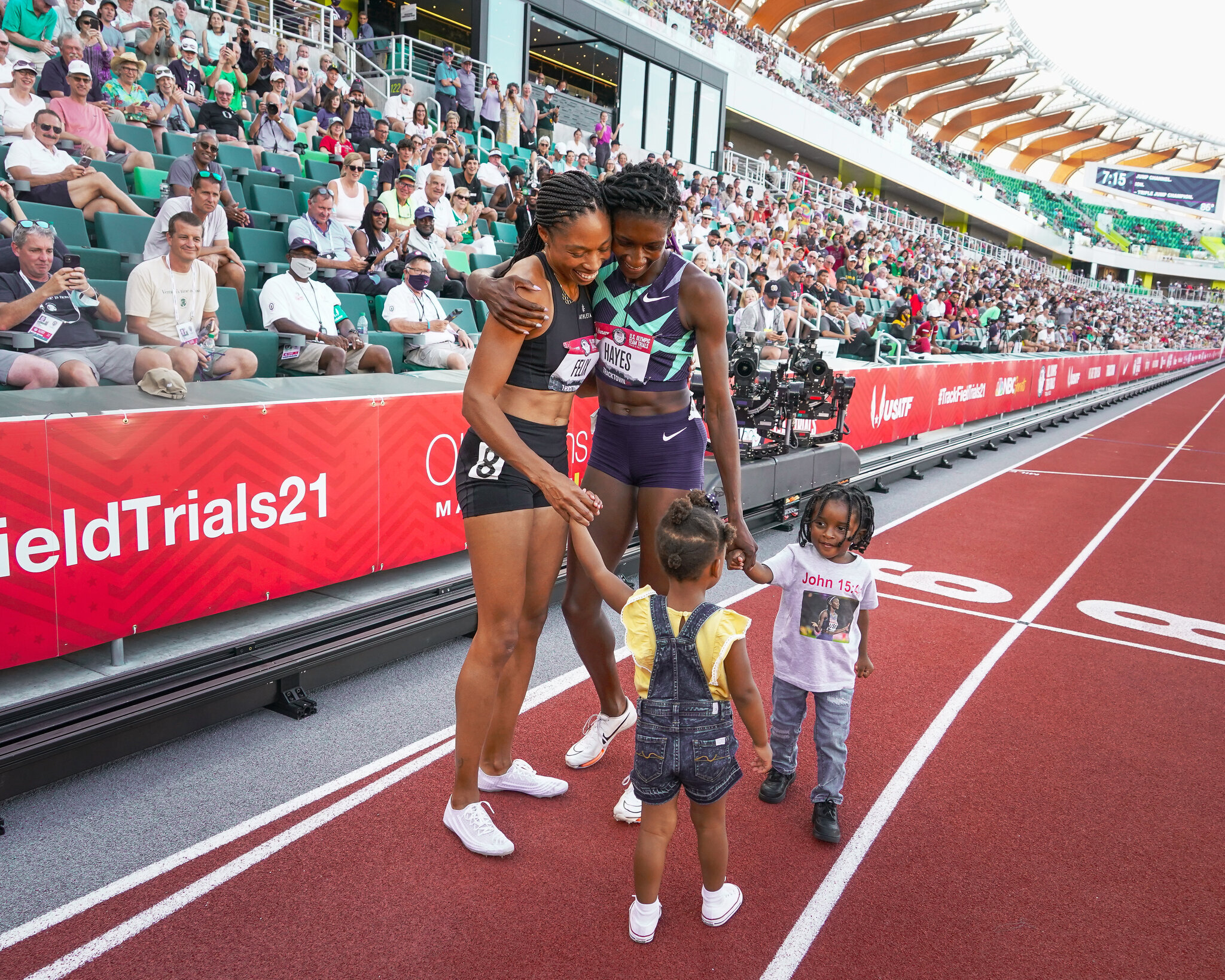In this two-part edition of the Thursday Tempo, I will share a recap of the U.S Olympic Trials and what to watch for in its final few days. I will also share some of the factors I look for before signing up for a new race!
As most of the world reawakens and reconnects following the global pandemic, racing is making its much-anticipated return with the U.S. Olympic Trials in full swing in Eugene, Oregon and a successful Grandma’s Marathon at 50% capacity last weekend in Duluth, Minnesota.
Safety precautions are still being taken for many imminent races and ones later in the fall. The world’s largest 10K race, the Atlanta Journal-Constitution Peachtree Road Race on July 3, is being reframed as “the world’s safest” with a smaller field, rolling start waves, and pre-race screenings or proof of vaccination. As COVID-19 vaccination rates increase and more large-scale events happen safely, it is likely races will continue to return with fewer constraints, at least in the U.S.
1. U.S. Olympic Trials
The trials for Tokyo 2021 resume today after an exciting first weekend with qualifiers for the women’s 10K, men’s 1500M and 5K, and men’s and women’s 200M yet to be determined. For the most part, talented new faces have risen to the challenge against veteran runners and overcome temperatures in the 90s to make their first Olympics. A few highlights with links to watch the races:
Women’s 100M: Sha’Carri Richardson extended her rise to stardom with a comfortable win in both the semi-finals (10.65) and finals (10.87), celebrating with a powerful declaration of victory, emotional post-race interview, and beautiful embrace of her grandmother. She is joined by two other Nike athletes, Javianne Oliver and Teahna Daniels.
Men’s 100M: Trayvon Bromell is now 10 out of 10 in his 100M races this year, winning the trials in 9.80 and headed to Tokyo along with two first-time Olympians Ronnie Baker (9.85) and Fred Kerley (9.86). Bromell was 8th at the 2016 Olympics in Rio when he was 21 years old.
Women’s 400M: Allyson Felix made her 5th Olympic team with a 50.02. In the final 50M homestretch, Felix powered her way from the middle of the pack to finish second through pure grit and determination. She accompanies Quanera Hayes (49.78) and Wadeline Jonathas (50.03). Similar to six-time Olympic medalist Jackie Joyner-Kersee, Felix proved that age is no barrier.
Women’s 5000M: Bowerman Track Club took the top two honors with Elise Cranny (15:27) dropping a 63-second final lap to finish ahead teammate Karissa Schweizer (15:28). Rachel Schneider (15:29) came in third, ahead of fan favorite and first-round winner Abbey Cooper (15:31). Cranny is a vocal advocate for body positivity in women runners and used her experience with Relative Energy Deficiency in Sport (RED-S) and healthy fueling to cross the line.
Men’s 10K: Similar to the Women’s 5K, first and second went to Bowerman Track Club with Woody Kincaid (27:53) outkicking Grant Fisher (27:54) for the win, closely followed by Joe Klecker (27:54). Kincaid demonstrated that having a finishing kick can be the difference, even in a long distance track race like the 10K.
What to watch for:
Women’s 10K (Saturday 6/26 @ 1PM ET): Several of the top American distance runners such as Sara Hall and Emily Sisson who both DNF’ed at the marathon trials, as well as Ednah Kurgat and Marielle Hall will be vying for a trip to Tokyo. If Cranny and Schweizer toe the line after already qualifying in the 5K, the competition will be fierce.
Women’s 200M (Saturday 6/26 @ 10:24PM ET): Can Allyson Felix add one more event to her fifth and final Olympic Games?
Men’s 5K (Sunday 6/27 @ 1PM ET): Will 2016 silver medalist Paul Chelimo, who has the fastest time in the field (12:57), upset the Bowerman party?
Women’s 800M (Sunday 6/27 @ 7:30PM ET): Texas A&M phenom Athing Mu has the collegiate indoor and outdoor records and will be running her first race as a professional athlete.
Men’s 1500M (Sunday 6/27 @ 7:40PM ET): 18-year-old Hobbs Kessler hit the Olympic standard with a 3:34 in May that also shattered the national high school record. Can he contend with reigning gold medalist Matt Centrowitz, whose personal best of 3:30 is a full three seconds faster than anyone else?
Men’s 200M (Sunday 6/27 @ 7:52PM ET): Will 23-year-old rising star and world champion Noah Lyles become an Olympian after failing to qualify in the 100M?
2. Signing Up for Your Next Race
There are over 1,000 marathons in the U.S. each year. My favorite site to discover races is Running in the USA, which claims to be the largest online directory of races and clubs, and I believe them. You can find races by month, type (run, trail run, last person standing, relay, stair climb, etc.), distance, and location broken down by region or state. They even have a feature to find marathons in different states on consecutive days, with the ability to specify distance between cities. I have shamelessly used this “Double Stater” option to plan back-to-back marathons in Indiana and Ohio, Mississippi and Alabama, Iowa and South Dakota, and New Hampshire and Maine.
What I like most about the site is that the race information is updated often with details about the race status in the prior, current, and future years. My top feature request would be to include runners’ reviews and comments about the races as I often cross-check other sites like marathonguide.com before signing up for a race I haven’t heard about.
Here are a few details you should pay attention to before signing up for a race, which can be very helpful for deciding between races, especially newer or smaller races.
Aid stations: How often are aid stations and what will be provided at them? I’ve experienced everything from aid stations every mile at the major marathons to aid stations with self-serve gatorade coolers or even fully self-supported races. Aid stations can influence what fuel you carry and what your nutrition plan will be.
Bib pickup: Is there bib pickup on race morning or does it have to be the day before, and if so, by when? I have decided against certain races that don’t allow for same-day bib pickup because I couldn’t get there in time, and some races can be very strict about their policy. Same-day bib pickup can have its own issues if there are limited staff and long lines on race morning.
Course: Is it point-to-point or out-and-back? How many sharp turns and steep hills? Is the course well-marked? Any safety concerns? My most interesting experiences have ranged from jumping over streams and climbing ladders in trail races to bear warnings, elk crossings, and hail storms.
Elevation: Is it flat and fast for a PR? What is the total elevation gain and drop? It is sometimes difficult to find this information on the race website. Reaching out to the race director or searching past results of the race name on Strava can help.
Prizes: Are there overall awards and age group awards? What were the winning or top age group times from the prior years? While this may not be relevant for large-scale events for most runners, it can be relevant for everyone in small races. Since I have run many small races across the U.S., my prizes have included a large rock, children’s books, a round-trip ticket on Alaska Airlines, a silver horseshoe, gift certificates to local businesses, plaques, a bottle of whiskey, and cold hard cash.
Refund policy: Are there refunds if you can no longer race? Is there a deferral policy? It has been rare for me to not start a race I have signed up for, but it has happened due to illness and injury. Even if a race website is strict about no refunds, reaching out to the race director for a deferral to the following year’s race will often be successful.
Registration policy: What are the registration deadlines? Are there discounts for registering early? Is there same-day registration? You can often find discounts to races by searching social media or reaching out to affiliated race organizations. Sometimes race organizers will offer you a free entry if you help market their race!
Transportation: Are there subsidized race hotels or other lodging options near the start/finish? Does the race provide transportation options to the start and from the finish? From an experience I had sleeping in my rental car in the town of Marathon, Iowa, I have learned to book accommodations and rental cars soon after signing up for the race, as local options can be limited, non-existent, or egregiously expensive close to race day.


